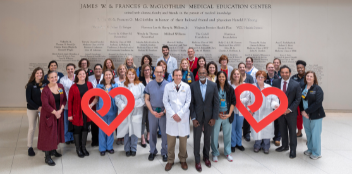Kron Targets Cardiac Sarcoidosis
Sarcoidosis involves the growth of granulomas—small clumps of inflammatory cells. The granulomas most commonly appear in the lungs but can form in almost any organ, including the heart. The inflammation can ultimately lead to fibrosis, or scar tissue, which can permanently damage the organ.

“Cardiac involvement is very important to diagnose and treat because it can lead to life-threatening rhythm problems,” said cardiac electrophysiologist Dr. Jordana Kron.
Cardiac sarcoidosis is a rare, inflammatory disease that has no known cause or cure and can affect patients of all ages. Kron began studying the disease when she joined Pauley faculty in 2008. Her first research project—a multicenter study—explored the safety and effectiveness of using implantable cardiac defibrillations to prevent cardiac arrest in patients.
“We collected data on 235 patients with cardiac sarcoidosis and showed that implantable cardiac defibrillators helped to prevent the risk of sudden death,” she said.
Kron, along with leaders from the University of Michigan and University of Colorado, founded the Cardiac Sarcoidosis Consortium, an international network of centers committed to collaborative research on cardiac sarcoidosis. Currently, there are 26 participating centers from the U.S., Europe and Asia, who have more than 300 patients with the condition enrolled, who are tracked in a database.
Last May, the consortium presented two abstracts at the scientific sessions of the Heart Rhythm Society in Chicago. One study showed results that most patients with cardiac sarcoidosis often experience a significant delay in diagnosis. The second study explored the use of immunosuppression medications as a therapy. That study found that more than half of the patients receiving therapy were treated with a steroid-sparing agent—most commonly methotrexate—either alone or in conjunction with steroids.
“While steroids are the mainstay of treatment to suppress inflammation, steroids have many negative side effects, including diabetes, osteoporosis, increased risk of infection and weight gain,” she said. “More research is needed to determine the best treatment strategies for these patients.”
To better understand the disease and help patients, Kron, together with rheumatologist Dr. Huzaefah Syed, and pulmonologists Dr. Aamer Syed and Dr. Thomas Iden, started the multidisciplinary sarcoidosis clinic at VCU Health in 2015. The clinic, the only one of its kind in the mid-Atlantic region, allows patients to see as many as three specialists in the same visit.
“In most sarcoidosis clinics, patients are seen only by a pulmonologist,” she said.
The clinic is offered an average of four times per week, drawing patients from all over Virginia. Its 1,600 patients have cardiac and/or other forms of sarcoidosis.
“Patients with sarcoidosis require close management, so we work together as a team to make sure we are looking at the whole picture and treating all the involved organ systems,” she said.
Through the clinic, Kron and her colleagues “are developing a unified approach to this complex disease, and we believe this will result in superior outcomes for patients,” said Dr. Ellenbogen.
Meet the physicians of the Sarcoidosis Clinic at https://youtu.be/DMMaTjD-wh0.
Back to Spring-2018

